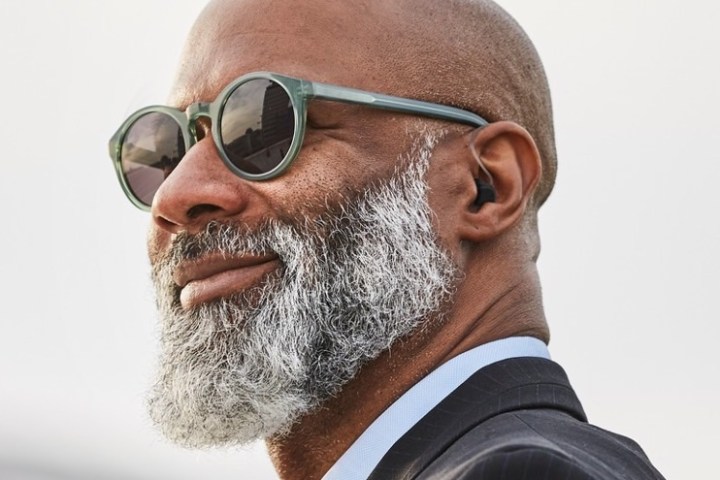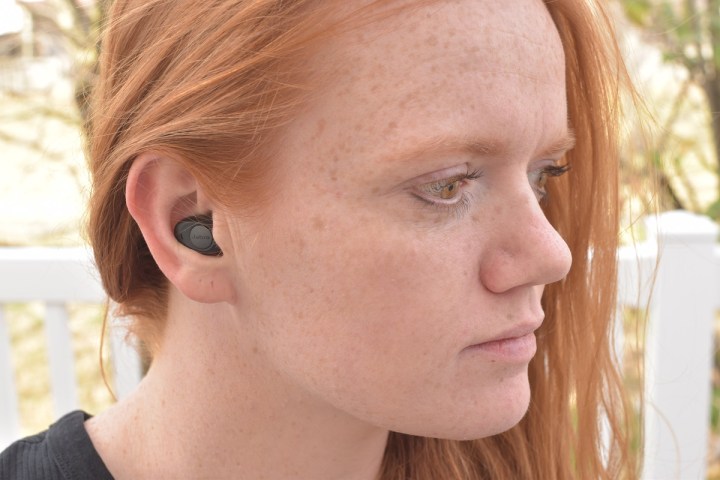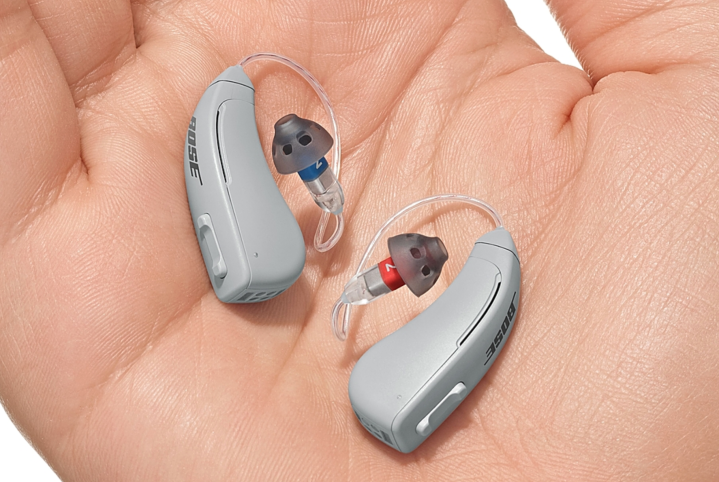
It’s been a little less than two years since the Food and Drug Administration formally cleared the way for over-the-counter hearing aids — a new class of medical device aimed specifically at those with mild to moderate hearing loss. With prices that can sometimes be less than half the cost of traditional prescription hearing aids, and without the requirement of a trip to an audiologist’s office, these new products have expanded Americans’ access to hearing help.
Some 35 million Americans older than 12 have mild or moderate hearing loss. Yet, according to the Hearing Loss Association of America (HLAA), only 1 in 5 people who could benefit from hearing aids have them. Given these stats and the availability of OTC devices, we should be in a new golden age for better hearing health.
But even though there are more than 40 companies now selling OTC devices, we haven’t seen a significant increase in adoption.
According to stats collected in January 2024, the U.S. OTC hearing aid market was worth just $123 million. To put that in perspective, if we use an average cost of $1,000, that would mean only 123,000 devices were sold. Or put another way, only 0.35% of Americans who could benefit from the devices bought them. More worryingly, some experts fear that those who do opt for OTC hearing aids may be at risk of worsening their hearing loss.
Who should use an OTC hearing aid?

Experts agree there’s a lot of confusion in this space.
“We’ve heard from many people that they’re confused about OTC hearing aids,” HLAA Executive Director Barbara Kelley told Digital Trends. “HLAA did a survey recently, and we found that 63% of the people said they didn’t have enough information about OTC hearing aids to make a purchase.”
The confusion is understandable. The FDA has a clear and concise explanation of what is (and isn’t) an OTC hearing aid, who they’re for, and how they work — they’re strictly for folks who suffer from mild-to-medium perceived hearing loss.
Unfortunately, unless you were to search “OTC hearing aids,” it’s unlikely you’d ever come across it. Moreover, by the time you realize that you might need an OTC product, it could be too late.
“The majority of OTC candidates are not aware that they have a hearing loss,” said Dr. Leigh Smith, an audiologist and owner of Florida Audiology Associates, just north of the Tampa Bay area on Florida’s Gulf Coast — a prime location for those who might be suited for OTC hearing aids. “If patients began screening their hearing at the recommended age of 65, we’d see a wider range of OTC candidates. However, by the time most patients begin screening their hearing or have a suspected loss of hearing, many fall outside of OTC guidelines.”

If your hearing difficulty has progressed from the mild-to-medium range that OTC devices are designed to address, you may be disappointed if you eventually try them. This was reflected in a 2023 study by the American Speech-Language-Hearing Association (ASHA), which cited effectiveness in addressing hearing difficulties as the No. 1 reason for dissatisfaction with OTC hearing aids, followed closely by concerns over poor sound quality.
This could help explain the relatively high return rates of OTC devices seen so far. The aptly named Eargo, one of the few hearing aid companies that releases quarterly reports, saw a 34% return rate in the second quarter of 2023 — a number that has actually gone up from 24% in 2021.
The return rate for the OTC category as a whole might be even higher. “Anecdotally, we have seen that about 50% of individuals who purchase an over-the-counter device return the device,” Dr. Ruth Reisman, an audiologist, adjunct professor of audiology, and the owner of Urban Hearing in Brooklyn, New York, told us.
The need for guidance

Perhaps the biggest hurdle facing the OTC category is one of its own making. Accessibility was seen as one of the biggest barriers to people getting the right hearing help at the right time. And because OTC hearing aids can now be sold in-store or online without any prescription or professional consultation, their availability has exploded.
Many have likened this scenario to being able to buy reader glasses instead of visiting an optometrist for a set of prescription frames. Unfortunately, hearing loss can be much more complicated than simply needing a boost of volume.
“It’s rare to be exactly within [the FDA’s mild-to-medium loss] range,” Reisman said. “They could have a sloping hearing loss. They could have a flat hearing loss. They can have a rising loss. It varies from person to person.”
Without a professional hearing test, there’s no way to know. Some OTC hearing aids have app-based tests designed to tune the devices to your specific hearing needs — Jabra’s Enhance series and Sony’s CRE-C10/E10 are two notable examples. But even these have limitations.
Apps typically offer adjustments to large frequency bands like bass, high-frequency, and mid-frequency. But, Resiman said, they lack the fine-tuned, frequency-specific adjustments needed for complex hearing loss.
Some of Reisman’s patients discovered this after their OTC purchase. “They say they spent $1,000 on this device, and it basically doesn’t work,” she said.
Smith found the same thing was true in her practice in Florida. “Since the start of 2024, our practice has only seen two patients with OTC hearing aids — neither of which were actual candidates for the devices and needed prescription hearing aids.”
Can an OTC hearing aid make your hearing worse?

Needless to say, no one expects to make their hearing loss worse when they buy a set of hearing aids. And, yet, it’s a risk. There are two main ways this can happen: actively and passively.
If a set of hearing aids provides too great a level of amplification, they can actively make your hearing loss irreversibly worse over time. This risk is greatest when you buy products that are labeled as hearing aids but actually are personal sound amplification products, or PSAPs.
PSAPs are often visually indistinguishable from OTC hearing aids. They sell for far less than OTC hearing aids — sometimes well under $100 — which makes them very attractive. But unlike OTC products, they’re entirely unregulated, and nothing is stopping them from delivering unsafe levels of amplification.
The FDA has strict rules around the features a product must have to qualify as an OTC hearing aid. But enforcement has proven weak. As early as November 2022, Amazon came under pressure to clean up its listings — many of the supposed OTC hearing aids on its site actually were PSAPs.
Amazon promised to address the problem, telling ConsumerAffairs that “we have proactive measures in place to prevent prohibited listings so customers can shop with confidence.”
However, a quick search for “otc hearing aids” on Amazon still yields dozens of devices that use the term OTC in their titles along with the words “hearing aids,” yet which are just PSAPs.
Given the FDA’s rules, you’d think a set of genuine OTC hearing aids would be free from over-amplification concerns. But Reisman said that isn’t always the case. She regularly tests both prescription and OTC hearing aids to see how they perform out-of-the-box and has found instances where these devices exceed what she refers to as “uncomfortable loudness levels or upper tolerance levels for the ear.”
Even if your OTC hearing aids conform to the FDA’s guidelines for amplification safety, they could be passively harming you. Hearing loss can be caused by a variety of factors. Some, like noise-induced hearing loss, are linear. The louder the sounds and the longer you’re exposed to them, the worse your hearing will get. And even though the damage caused is permanent, it doesn’t get worse on its own — only continued exposure to loud sounds can do that.
There are medical conditions, however, that can also cause hearing loss. Left unchecked, these can be progressive, ultimately leading to permanent and sometimes total loss of hearing. In the early stages of these conditions, hearing loss may be mild and an OTC product could offer substantial relief. But if it keeps you from being examined by your doctor or an audiologist, you may not receive adequate care.
“At-home tests are unable to identify the site of the problem (outer ear, middle ear, or inner ear), are not performed with calibrated equipment or under sound isolation standards, and do not test speech or background noise performance of the patient,” Smith said. “In my professional opinion, there is no positive side to at-home testing.”
OTC hearing aid manufacturers appear to be struggling with the balance between convenience and quality health care. Sony, the only manufacturer that responded to our questions, reiterated several times that its customers benefit from the ability to purchase its hearing aids — mostly from online stores — without the need for a doctor’s prescription.
However, when we asked specifically about its relationship with audiologists, Sony’s head of business development for over-the-counter hearing aids, Takuya Sakamoto, told us that “they continue to offer counseling on what is the right option for each patient and their guidance on what to purchase, which is still a critical component of a patient’s overall hearing health care journey.”
It’s still day one

While it seems that the OTC hearing aid market is off to a rocky start, there are also reasons to be optimistic.
“It’s still day one of this entirely new market,” said Kelley, of the Hearing Loss Association of America. And both the HLAA and the ASHA agree that more needs to be done to increase education.
To that end, the HLAA, along with OTC manufacturers and health care providers, are creating more resources to help people understand who these devices are for.
It has created a Tip Sheet and frequently conducts “OTC-101 Ask the Experts“ webinars that let people ask questions so they can make informed decisions about their hearing health. All of its resources can be found at hearingloss.org/OTC, and the next webinars are planned for May 22 and June 5, 2024.
Everyone we spoke to also agrees that despite ongoing misconceptions about hearing aids, the topic of hearing health has received a significant boost in awareness thanks to the publicity surrounding OTC products.
“This is a good thing for the entire hearing health community,” Kelley said. “Many of us don’t pay attention to our hearing, even though it’s a crucial part of overall health and well-being.”
Reisman also expressed cautious optimism: “Hearing in general is getting a lot of press which is bringing awareness. For those people who are motivated to at least try and pursue something over nothing, then I think that’s great as long as they’re taking the necessary precautions — getting medically evaluated and getting their hearing assessed.”
The additional awareness may also help with one of the leading reasons why people don’t seek help for their hearing loss. According to the ASHA’s 2023 polling, “more than half of American adults ages 40 and older (56%) acknowledged lacking excellent hearing, but only 8% had been treated. The primary reason for not seeking help was the belief that the hearing difficulties being experienced weren’t ‘bad enough’ to warrant care.”
What to do if you’re considering OTC hearing aids
Having your hearing professionally assessed remains the best advice for those who believe they have untreated hearing loss. Whether this results in the purchase of an OTC hearing aid or a prescription device, you’ll know where you stand and you’ll be able to monitor the progression of your hearing health over time.
However, if you’re thinking of buying an OTC product directly, here are some good rules of thumb:
- Make sure the product is a genuine OTC hearing aid and not a PSAP, which can be difficult to do when looking at a product description on Amazon.
- Stick with big, familiar brands.
- If a product is priced very cheaply, e.g. under $200, that’s a sign you should be cautious.
- The FDA maintains a database of registered OTC hearing aid products — if you can’t find the product you’re considering, that might also be a red flag.
- When in doubt, ask a doctor.
It can take our brains a long time to adapt to hearing aids, so make sure there’s a generous return period — the FDA’s rules do not mandate this, so you’ll have to do your homework. Sony and Eargo both offer 45-day trial periods, which seems to have become an industry norm. But longer windows also exist: Jabra’s free trial lasts 100 days.
Finally, you may want to think about each company’s support commitments. Since most OTC products can’t be adjusted or fine-tuned by an audiologist, you’ll be limited to the adjustments you can make within the companion app (if there’s no app, there will be very few available adjustments). Some companies can connect you to a remote hearing specialist via the app, who can further adjust the hearing aids with your input.
Editors' Recommendations
- Sennheiser’s All-Day Clear are its first OTC hearing aids
- JLab’s new earbuds are smaller than a dime, and it says $99 hearing aids are on the way
- These are Sony’s first over-the-counter hearing aids
- Expect to hear more about hearing, now that the FDA’s new hearing aid rules are here
- Olive Max provides low-cost alternative to hearing aids




